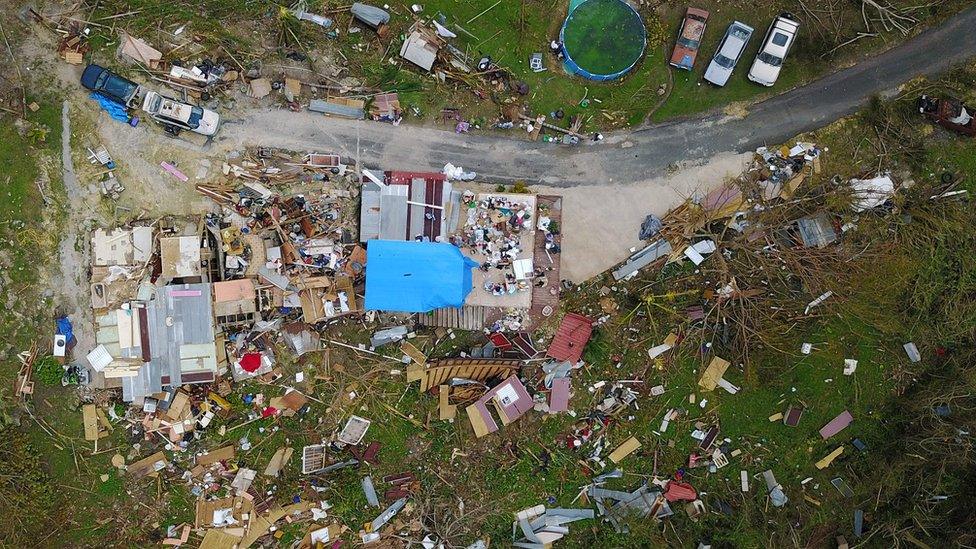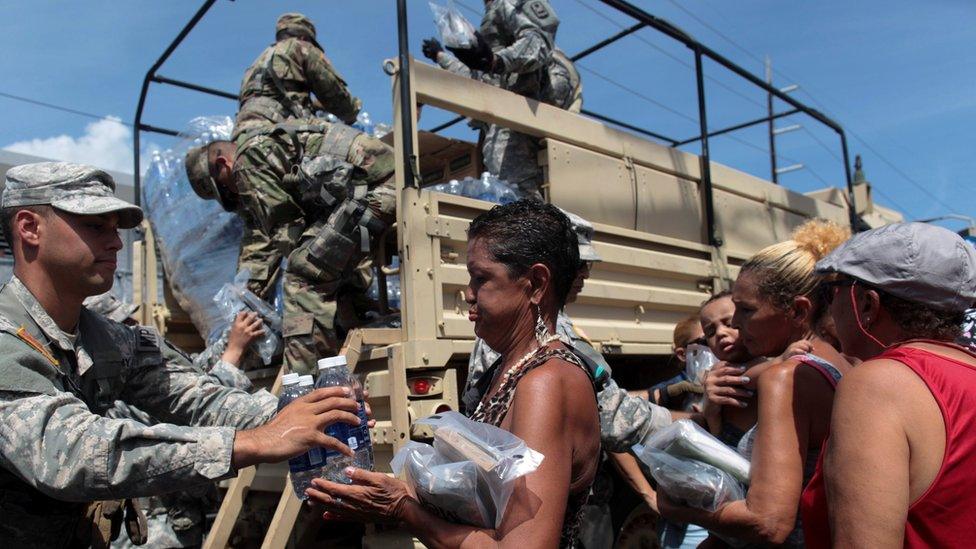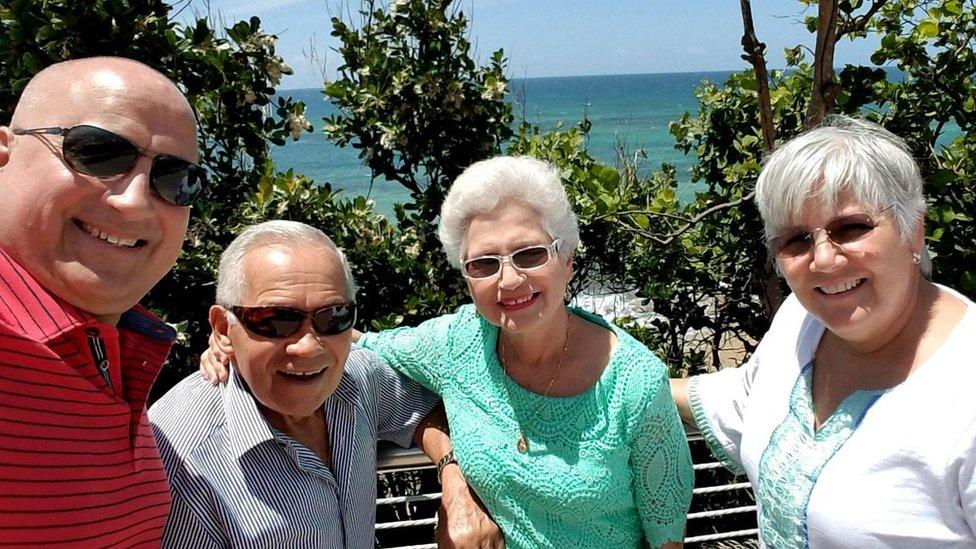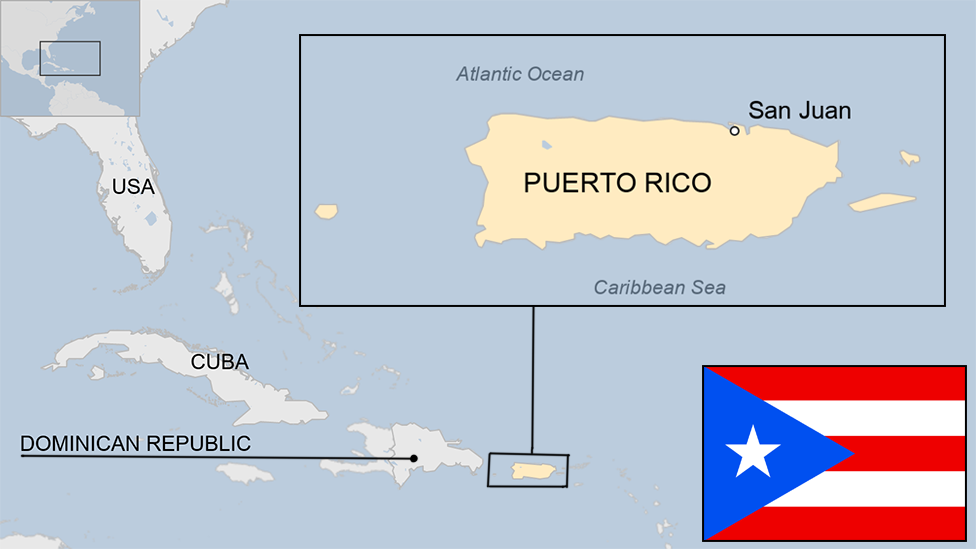Hurricane Maria: Trump defends Puerto Rico response
- Published
Why Hurricane Maria hit Puerto Rico so hard
US President Donald Trump has defended his response to the disaster in Puerto Rico, which has been ravaged by Hurricane Irma and Hurricane Maria.
Much of the US island territory has lost power, while residents say they are running low on medicines and food.
Critics have accused Mr Trump of being slow to respond, and of showing more concern for Texas and Florida after they were hit by hurricanes.
Mr Trump has announced he will visit Puerto Rico next week.
"That island was hit as hard as you can hit," he said, adding the US was sending food, water and supplies on "an hourly basis" to the island.
Hurricane Maria battered Puerto Rico last Wednesday, killing 16 people and knocking out electricity, water and telephone services.
It tore through the island as one of the most powerful storms in nearly 90 years.
About 44% of the 3.5 million residents living on the island are still without clean drinking water six days after the storm barrelled through, the Defence Department said on Tuesday.
The mayor of San Juan, Puerto Rico's capital, told the BBC the island was "in a humanitarian crisis".
"Our hospitals have no diesel. And of course no diesel means no life support systems," Carmen Yulin Cruz said.
"People that are dependent on diesel in order to breathe are running out of diesel or their batteries are running out. So they're really fighting life or death situations."
Gerardo Torres, a doctor in San Juan, told the BBC that "operating rooms are closed due to lack of air conditioning and operating kits cannot be sterilised".

Nearly half of the US island territory lacks clean drinking water
Meanwhile, resident Christina Cabrero told the BBC she was unable to reach her father's doctors to discuss his cancer treatment because phone lines had been destroyed.
The island's government has asked a judge to defer key deadlines in its bankruptcy case as it grapples with Maria's devastation.
Mr Trump came under fire after he spent the weekend focusing on a feud with NFL players and coaches, instead of acknowledging the Puerto Rico disaster.
He tweeted about the crisis on Monday - but angered critics by suggesting that the island's $72bn (£53bn) debt needed to be addressed amid its appeal for relief aid.
Allow X content?
This article contains content provided by X. We ask for your permission before anything is loaded, as they may be using cookies and other technologies. You may want to read X’s cookie policy, external and privacy policy, external before accepting. To view this content choose ‘accept and continue’.
Allow X content?
This article contains content provided by X. We ask for your permission before anything is loaded, as they may be using cookies and other technologies. You may want to read X’s cookie policy, external and privacy policy, external before accepting. To view this content choose ‘accept and continue’.
Allow X content?
This article contains content provided by X. We ask for your permission before anything is loaded, as they may be using cookies and other technologies. You may want to read X’s cookie policy, external and privacy policy, external before accepting. To view this content choose ‘accept and continue’.
On Tuesday, the White House announced that Mr Trump had increased federal funding and assistance for debris removal and emergency protective measures in Puerto Rico in the aftermath of the storm.
Mr Trump said he would visit the territory next Tuesday - nearly a fortnight after the storm struck - because it was the "earliest I can go without disrupting relief efforts".
He may also visit the US Virgin Islands, which was hit by both Hurricane Maria and Irma.
Trump 'never seen anything like Puerto Rico'
Mr Trump said his administration was doing a "really good job" and that the Governor of Puerto Rico, Ricardo Rossello, was "so grateful".
He said rescue efforts were complicated because Puerto Rico was offshore.
"This is a thing called the Atlantic ocean, this is tough stuff," he said.
He added: "Puerto Rico is very important to me. The people are fantastic. I grew up in New York so I know many Puerto Rican people."
Mr Rossello told Reuters Mr Trump's handling of the disaster had been "excellent" and that the government had "responded very quickly" to the crisis.
More than 10,000 US Federal Emergency Management Agency (Fema) staff are on the ground in Puerto Rico and the US Virgin Islands to assist with relief efforts, according to the agency.
- Published26 September 2017

- Published27 September 2017

- Published11 September 2023
